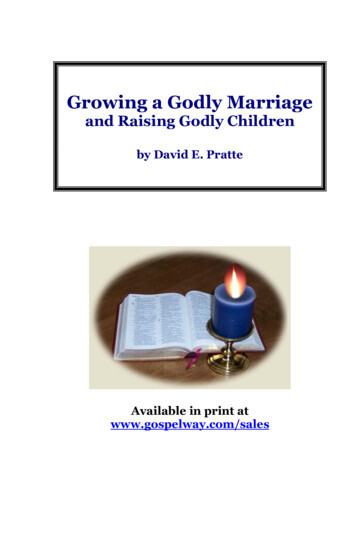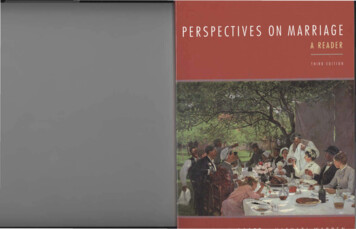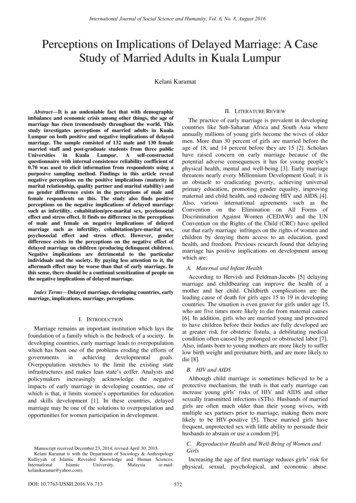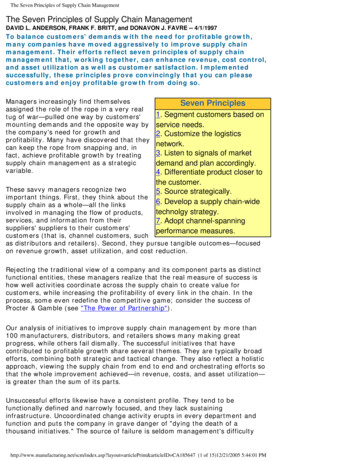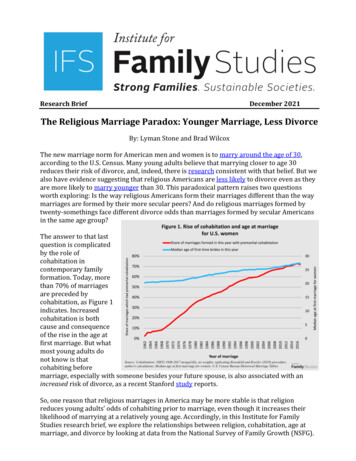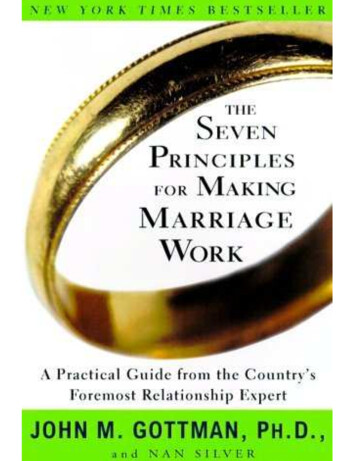
Transcription
Seven principles For making marriage workBy John M. Gottman, Ph.D, and Nan SilverCROWN PUBLISHERS, INC.NEW YORKThe anecdotes in this book are based on Dr. Gottman's research. Someof the couples are composites of those who volunteered to take part inhis studies. In all cases, names and identifying information have beenchanged. Grateful acknowledgment is made for permission to reprintfrom After the Honeymoon
To Julie Gottman, who gives collaboration a new meaning, and to thecore of my team: Sybil Carr ere, Sharon Fentiman, and Cathryn Swanson. They made it all possible and helped make the journey itselfdelightful, like eating pastries and drinking coffee together in asidewalk cafe.J.G.To Arthur, my beloved and my friendN. S.
AcknowledgmentsFirst and foremost, I need to acknowledge the brave gift that severalthousand volunteer research couples have contributed to myunderstanding. Their willingness to reveal the most private aspects oftheir personal lives has opened a hitherto closed door that has made itpossible to construct these Seven Principles for making marriageswork.This book was based on research that received continuoussupport from the National Institute of Mental Health, the BehavioralScience Research Branch. Of great assistance was the dedicatedguidance of Molly Olive ri, Delia Hahn, and Joy Schulterbrandt.This book was also made possible by a number of importantcollaborations that have been a joyful part of my life. These includethe main collaboration that has graced my life for the past nineteenyears with Professor Robert Levenson of the University of California.Also important to me has been my collaboration with NeilJacobson of the University of Washington and my work with Dr. LauraCarstensen of Stanford University I have been blessed with richassociations inside my laboratory.The cornerstones have been Sharon Fentiman, whose elegancegreatly improves my life and keeps me from chaos; Dr. Sybil Cart ere,who runs my lab and is a terrific colleague; and Cathryn Swan son,my programmer and data analyst. Not only are they friends andintellectual companions, but they help make coming to work apleasant experience. I also wish to acknowledge the contributions andstimulation of Lynn Katz.My wife, Julie Schwartz Gottman, provided love, friendship,motivation, intellectual camaraderie, support, and conceptualorganization. She has also been my teacher and guide in practicing
psychotherapy. She made doing the couples' and parents' workshopsan exciting creative experience. While we are busy with our full-timejobs, Etana Dykan capably runs our Seattle Marital and FamilyInstitute with great spirit and attention to detail, and she also helpsfacilitate our communication. Her amazingly creative brother, ShaiSteinberg, has also been a tremendous asset in many areas of ourwork. Linda Wright helps us keep the couples' enterprise very warmand human--she is unusually gifted in talking to desperate couples.Peter Langsam has been our faithful consultant and partnerthroughout, helping us with wise counsel, elemental guidance, andbusiness sense.I have recently been blessed with excellent students and staff,including Kim Buehlman, Jim Coan, Melissa Hawkins, CaroleHooven, Vanessa Kahen, Lynn Katz, Michael Lorber, Kim McCoy,Janni Morford, Sonny Ruckstahl, Regina Rushe, Kimberly Ryan,Alyson Shapiro, Tim Stickle, and Beverly Wilson.I need to acknowledge the intellectual heritage upon which Idraw. As Newton once wrote, "If I have seen further . it is bystanding upon the shoulders of giants." For me these shouldersinclude the work of Les Green berg and Susan Johnson onemotionally focused marital therapy; Bob Weiss's scholarly work onmany concepts, including sentiment overrides; Cliff Notarius's workon many concepts, including couple efficacy; Howard Mark man'sfaith in preventive intervention; Dick Stuart's great contributions,including his approach to behavior exchange; Jerry Lewis's workfocusing on the balance of autonomy and connectedness in marriage;and the persistent work of my colleague Neil Jacob son, who is thegold standard for marital therapy research. I am also indebted toJacob son's recent work with Andy Christensen, on acceptance inmarital therapy I also wish to acknowledge the contributions of PeggyPapp and Pepper Schwartz and their feminist approach to genderdifferences and egalitarian marriage, as well as the work of RonaldLevant and Alan Booth on men in families.I must also mention Clan Wile's work on marital therapy, withits superb focus on process. I love Wile's writing and thinking. Theyare entirely consistent with many of my research findings. I think that
Wile is a genius and the greatest living marital therapist. I am blessedto have been able to exchange ideas with him.I wish to acknowledge the work of Irvin Yalom and VictorFrankl on existential psychotherapy. Yalom has provided a great faithin the therapeutic process itself and in the human force towardgrowth. Frankl holds a special place in my heart. He and my belovedcousin Kurt Ladner were both residents and survivors of the Dachauconcentration camp. Both found meaning in the context of intensesuffering, tyranny, and dehumanization. I hope to bring theirexistential search for meaning into the marital context. Doing so canturn conflict into a new experience of revealing and honoring lifedreams, finding shared meaning, and reaffirming the maritalfriendship.I have come to the conclusion that many insightful writers inthe marital field are basically correct. I hope my contribution will beto honor them all, adding a bit of precision and integration to thestruggle to understand what makes close relationships work.J.G.
Contents1 Inside the Seatle Love Lab: The Truth about Happy Marriages .12 How I Predict Divorce. 253 Principle 1: Enhance Your Love Maps . 474 Principle 2: Nurture Your Fondness and Admiration . 615 Principle 3: Turn toward Each Other Instead of Away . 796 Principle 4: Let Your Partner Influence You. 997 The Two Kinds of Maritial Conflict . 1298 Principle 5: Solve Your Solvable Problems . 1579 Coping with Typical Solvable Problems . 18710 Principle 6: Overcome Gridlock . 21711 Principle 7: Create Shared Meaning. 243Afterword: What Now?. 259
g{xSEVEN PRINCIPLESyÉÜMAKINGMARRIAGEWORK
11Inside the Seattle Love Lab:The Truth aboutHappy MarriagesIt's a surprisingly cloudless Seattle morning as newly-wedsMark and Janice Gordon sit down to breakfast. Outside theapartment's picture window, the waters of Mont lake cut a deep-blueswath, while runners jog and geese waddle along the lakeside park.Mark and Janice are enjoying the view as they munch on their Frenchtoast and share the Sunday paper. Later Mark will probably switch onthe football game while Janice chats over the phone with her mom inSt. Louis.All seems ordinary enough inside this studio apartment--untilyou notice the three video cameras bolted to the wall, themicrophones clipped talk-show style to Mark's and Janice's collars,and the Holter monitors strapped around their chests. Mark andJanice's lovely studio with a view is really not their apartment at all.It's a laboratory at the University of Washington in Seattle, where forsixteen years I have spearheaded the most extensive and innovativeresearch ever into marriage and divorce.As part of one of these studies, Mark and Janice (as well asforty-nine other randomly selected couples) volunteered to stay overnight in our fabricated apartment, affectionately known as the Love
2Lab. Their instructions were to act as naturally as possible, despite myteam of scientists observing them from behind the one-way kitchenmirror, the cameras recording their every word and facial expression,and the sensors tracking bodily signs of stress or relaxation, such ashow quickly their hearts pound. (To preserve basic privacy, thecouples were monitored only from nine a.m. to nine P.M. and neverwhile in the bathroom.) The apartment comes equipped with a foldout sofa, a working kitchen, a phone, Tv VCR, and CD player.Couples were told to bring their groceries, their newspapers, theirlaptops, needlepoint, hand weights, even their pets-whatever theywould need to experience a typical weekend.My goal has been nothing more ambitious than to uncover thetruth about marriage--to finally answer the questions that havepuzzled people for so long: Why is marriage so tough at times? Whydo some lifelong relationships click, while others just tick away like atime bomb? And how can you prevent a marriage from going bad--orrescue one that already has?Predicting divorce with 91 percent accuracyAfter years of research I can finally answer these questions. In fact, Iam now able to predict whether a couple will stay happily together orlose their way. I can make this prediction after listening to the coupleinteract in our Love Lab for as little as five minutes! My accuracy ratein these predictions averages 91 percent over three separate studies.In other words, in 91 percent of the cases where I have predicted thata couple's marriage would eventually fail or succeed, time has provenme right. These predictions are not based on my intuition orpreconceived notions of what marriage "should" be, but on the dataI've accumulated over years of study.At first you might be tempted to shrug off my research resultsas just another in a long line of newfangled theories. It's certainly easyto be cynical when someone tells you they've figured out what reallymakes marriages last and can show you how to rescue or divorceproof your own. Plenty of people consider themselves to be experts
3on marriage--and are more than happy to give you their opinion ofhow to form a more perfect union.But that's the key word--opinion. Before the breakthroughs myresearch provided, point of view was pretty much all that anyonetrying to help couples had to go on. And that includes just aboutevery qualified, talented, and well-trained marriage counselor outthere. Usually a responsible therapist's approach to helping couples isbased on his or her professional training and experience, intuition,family history, perhaps even religious conviction. But the one thingit's not based on is hard scientific evidence. Because until now therereally hasn't been any rigorous scientific data about why somemarriages succeed and others flop.For all of the attention my ability to predict divorce has earnedme, the most rewarding findings to come out of my studies are theSeven Principles that will prevent a marriage from breaking up.Emotionally intelligent marriagesWhat can make a marriage work is surprisingly simple. Happilymarried couples aren't smarter, richer, or more psychologically astutethan others. But in their day-to-day lives, they have hit upon adynamic that keeps their negative thoughts and feelings about eachother (which all couples have) from overwhelming their positiveones. They have what I call an emotionally intelligent marriage.I can predict whether a couple will divorce afterwatching and listening to them for just five minutes.Recently, emotional intelligence has become widely recognizedas an important predictor of a child's success later in life. The more intouch with emotions and the better able a child is to understand andget along with others, the sunnier that child's future, whatever his orher academic IQ. The same is true for relationships between spouses.The more emotionally intelligent a couple -- the better able they are tounderstand, honor, and respect each other and their marriage -- the
4more likely that they will indeed live happily ever after. Just asparents can teach their children emotional intelligence, this is also askill that a couple can be taught. As simple as it sounds, it can keephusband and wife on the positive side of the divorce odds.Why save your marriage?Speaking of those odds, the divorce statistics remain dire. Thechance of a first marriage ending in divorce over a forty-year period is67 percent. Half of all divorces will occur in the first seven years.Some studies find the divorce rate for second marriages is asmuch as 10 percent higher than for first-timers. The chance of gettingdivorced remains so high that it makes sense for all married couples-including those who are currently satisfied with their relationship--toput extra effort into their marriages to keep them strong.One of the saddest reasons a marriage dies is that neitherspouse recognizes its value until it is too late. Only after the papershave been signed, the furniture divided, and separate apartmentsrented do the exes realize how much they really gave up when theygave up on each other. Too often a good marriage is taken for grantedrather than given the nurturing and respect it deserves anddesperately needs. Some people may think that getting divorced orlanguishing in an unhappy marriage is no big deal--they may evenconsider it trendy. But there's now plenty of evidence documentingjust how harmful this can be for all involved.Thanks to the work of researchers like Lois Verbrugge andJames House, both of the University of Michigan, we now know thatan unhappy marriage can increase your chances of getting sick byroughly 35 percent and even shorten your life by an average of fouryears. The flip side: People who are happily married live longer,healthier lives than either divorced people or those who areunhappily married. Scientists know for certain that these differencesexist, but we are not yet sure why.
5Part of the answer may simply be that in an unhappy marriagepeople experience chronic, diffuse physiological arousal—in otherwords, they feel physically stressed and usually emotionally stressedas well. This puts added wear and tear on the body and mind, whichcan present itself in any number of physical ailments, including highblood pressure and heart disease, and in a host of psychological ones,including anxiety, depression, suicide, violence, psychosis, homicide,and substance abuse.Not surprisingly, happily married couples have a far lower rateof such maladies. They also tend to be more health-conscious thanothers.Researchers theorize that this is because spouses keep aftereach other to have regular checkups, take medicine, eat nutritiously,and so on.People who stay married live four yearslonger than people who don't.Recently my laboratory uncovered some exciting, preliminaryevidence that a good marriage may also keep you healthier bydirectly benefiting your immune system, which spearheads thebody's defenses against illness. Researchers have known for about adecade that divorce can depress the immune system's function.Theoretically this lowering in the system's ability to fight foreigninvaders could leave you open to more infectious diseases andcancers. Now we have found that the opposite may also be true. Notonly do happily married people avoid this drop in immune function,but their immune systems may even be getting an extra boost.When we tested the immune system responses of the fiftycouples who stayed overnight in the Love Lab, we found a strikingdifference between those who were very satisfied with theirmarriages and those whose emotional response to each other wasneutral or who were unhappy. Specifically, we used blood samplesfrom each subject to test the response of certain of their white bloodcells-the immune system's major defense weapons. In general,happily married men and women showed a greater proliferation of
6these white blood cells when exposed to foreign invaders than did theother subjects.We also tested the effectiveness of other immune systemwarriors—the natural killer cells, which, true to their name, destroybody cells that have been damaged or altered (such as infected orcancerous ones) and are known to limit the growth of tumor cells.Again, subjects who were satisfied with their marriage had moreeffective natural killer cells than did the others.It will take more study before scientists can confirm that thisboost in the immune system is one of the mechanisms by which agood marriage benefits your health and longevity. But what's mostimportant is that we know for certain that a good marriage does. Infact, I often think that if fitness buffs spent just 10 percent of theirweekly workout time--say, twenty minutes a day--working on theirmarriage instead of their bodies, they would get three times thehealth benefits the derive from climbing the Stair-Master!When a marriage goes sour, husband and wife are not the onlyones to suffer--the children do, too. In a study I conducted of sixtythree preschoolers, those being raised in homes where there was greatmarital hostility had chronically elevated levels of stress hormonescompared with the other children studied. We don't know what thelong-term repercussions of this stress will be for their health. But wedo know that this biological indication of extreme stress was echoedin their behavior. We followed them through age fifteen and foundthat, compared with other children their age, these kids suffered farmore from truancy, depression, peer rejection, behavioral problems(especially aggression), low achievement at school, and even schoolfailure.One important message of these findings is that it is not wise tostay in a bad marriage for the sake of your children. It is clearlyharmful to raise kids in a home that is subsumed by hostility betweenthe parents. A peaceful divorce is better than a warlike marriage.Unfortunately, divorces are rarely peaceful. The mutual hostilitybetween the parents usually continues after the breakup. For thatreason, children of divorce often fare just as poorly as those caught inthe crossfire of a miserable marriage.
7Innovative research, revolutionary findingsWhen it comes to saving a marriage, the stakes are high for everybody in the family. And yet despite the documented importance ofmarital satisfaction, the amount of scientifically sound research intokeeping marriages stable and happy is shockingly small. When I firstbegan researching marriage in 1972, you could probably have held allof the "good" scientific data on marriage in one hand. By "good" Imean findings that were collected using scientific methods asrigorous as those used by medical science. For example, many studiesof marital happiness were conducted solely by having husbands andwives fill out questionnaires. This approach is called the self-reportmethod, and although it has its uses, it is also quite limited. How doyou know a wife is happy just because she checks the "happy" box onsome form? Women in physically abusive relationships, for example,score very high on questionnaires about marital satisfaction. Only ifthe woman feels safe and is interviewed one on one does she revealher agony.To address this paucity of good research, my colleagues and Ihave supplemented traditional approaches to studying marriage withmany innovative, more extensive methods. We are now followingseven hundred couples in seven different studies. We have not juststudied newlyweds but long-term couples who were first assessedwhile in their forties or sixties. We have also studied couples justbecoming parents and couples interacting with their babies, theirpreschoolers, and their teenagers.As part of this research, I have interviewed couples about thehistory of their marriage, their philosophy about marriage, how theyviewed their parents' marriages. I have videotaped them talking toeach other about how their day went, discussing areas of continuingdisagreement in their marriage, and also conversing about joyfultopics. And to get a physiological read of how stressed or relaxedthey were feeling, I measured their heart rate, blood flow, sweatoutput, blood pressure, and immune function moment by moment. Inall of these studies, I'd play back the tapes to the couples and askthem for an insiders' perspective of what they were thinking and
8feeling when, say, their heart rate or blood pressure suddenly surgedduring a marital discussion. And I've kept track of the couples,checking in with them at least every year to see how their relationshipis faring.So far my colleagues and I are the only researchers to conductsuch an exhaustive observation and analysis of married couples. Ourdata offer the first real glimpse of the inner workings—the anatomy-of marriage. The results of these studies, not my own opinions, formthe basis of my Seven Principles for making marriage work. Theseprinciples, in turn, are the cornerstones of a remarkably effectiveshort-term therapy for couples that I have developed along with mywife, clinical psychologist Julie Gottman, Ph.D. This therapy, andsome briefer workshops that follow the same principles, are intendedfor couples who find that their marriage is in trouble or just want toensure it stays strong.Our approach contrasts dramatically with the standard oneoffered by most marriage therapists. This is because as my researchbegan to uncover the true story of marriage, I had to throw out somelong-hallowed beliefs about marriage and divorce.Why most marriage therapy failsIf you've had or are having troubles in your relationship, you'veprobably gotten lots of advice. Sometimes it seems like everybodywho's ever been married or knows anyone who's ever been marriedthinks he holds the secret to guaranteeing endless love. But most ofthese notions, whether intoned by a psychologist on TV or by a wisemanicurist at the local mall, are wrong. Many such theories, eventhose initially espoused by talented theorists, have been longdiscredited--or deserve to be. But they have become so firmlyentrenched in the popular culture that you'd never know it.Perhaps the biggest myth of all is that communication--andmore specifically learning to resolve your conflicts --- is the royalroad to romance and an enduring, happy marriage. Whatever amarriage therapist's theoretical orientation, whether you opt for short
9term therapy, long-term therapy, or a three-minute radio consultationwith your local Frasier, the message you'll get is pretty uniform:Learn to communicate better. The sweeping popularity of thisapproach is easy to understand. When most couples find themselvesin a conflict (whether it gets played out as a short spat, an all-outscreaming match, or stony silence), they each gird themselves to winthe fight. They become so focused on how hurt they feel, on provingthat they're right and their spouse is wrong, or on keeping up a coldshoulder, that the lines of communication between the two may beovercome by static or shut down altogether. So it seems to make sensethat calmly and lovingly listening to each other's perspective wouldlead couples to find compromise solutions and regain their maritalcomposure.The most common technique recommended for resolvingconflict--used in one guise or another by most marital therapists--iscalled active listening. For example, a therapist might urge you to trysome form of the listener-speaker exchange. Let's say Judy is upsetthat Bob works late most nights. The therapist asks Judy to state hercomplaints as "I" statements that focus on what she's feeling ratherthan hurling accusations at Bob. Judy will say, "I feel lonely andoverwhelmed when I'm home alone with the kids night after nightwhile you're working late," rather than, "It's so selfish of you toalways work late and expect me to take care of the kids by myself."Then Bob is asked to paraphrase both the content and thefeelings of Judy's message, and to check with her if he's got it right.(This shows he is actively listening to her.) He is also asked tovalidate her feelings--to let her know he considers them legitimate,that he respects and empathizes with her even if he doesn't share herperspective. He might say: "It must be hard for you to watch the kidsby yourself when I'm working late." Bob is being asked to suspendjudgment, not argue for his point of view, and to respond nondefensively. "I hear you" is a common active-listening buzz word.Thanks to Bill Clinton, "I feel your pain" may now be the mostnotorious.By forcing couples to see their differences from each other'sperspective, problem solving is supposed to take place without anger.
10This approach is often recommended whatever the specific issue—whether your conflict concerns the size of your grocery bill or majordifferences in your lifelong goals. Conflict resolution is touted notonly as a cure-all for troubled marriages but as a tonic that canprevent good marriages from faltering.Where did this approach come from? The pioneers of maritaltherapy adapted it from techniques used by the renownedpsychotherapist Carl Rogers. For individual psychotherapy Rogerianpsychotherapy had its heyday in the 1960s and is still practiced invarying degrees by psychotherapists today. His approach entailsresponding in a nonjudgmental and accepting manner to all feelingsand thoughts the patient expresses. For example, if the patient says, "Ijust hate my wife, she's such a nagging bitch," the therapist nods andsays something like "I hear you saying that your wife nags you andyou hate that." The goal is to create an empathetic environment so thepatient feels safe exploring his inner thoughts and emotions andconfiding in the therapist.Since marriage is also, ideally, a relationship in which peoplefeel safe being themselves, it might seem to make sense to traincouples to practice this sort of unconditional understanding. Conflictresolution is certainly easier if each party expresses empathy for theother's perspective.The problem is that it doesn't work. A Munich-based maritaltherapy study conducted by Dr. Kurt Hahlweg and associates foundthat even after employing active listening techniques the typicalcouple was still distressed. Those few couples who did benefitrelapsed within a year.The wide range of marital therapies based on conflict resolutionshare a very high relapse rate. In fact, the best of this type of maritaltherapy, conducted by Neil Jacob son, Ph.D." of the University ofWashington, has only a 35 percent success rate. In other words, hisown studies show that only 35 percent of couples see a meaningfulimprovement in their marriages as a result of the therapy. A yearlater, less than half of that group--or just 18 percent of all coupleswho entered therapy-- retain these benefits. When Consumer Reportssurveyed a large sample of its members on their experience with allkinds of psychotherapists, most got very high customer satisfaction
11marks--except for marital therapists, who got very poor ratings. Thissurvey may not qualify as rigorous scientific research, but it confirmswhat most professionals in this field know: In the long run, currentapproaches to marital therapy do not benefit the majority of couples.When you really think about it, it's not difficult to see whyactive listening so often fails. Bob might do his best to listenthoughtfully to Judy's complaints. But he is not a therapist listening toa patient whine about a third party. The person his wife is trashingbehind all of those "I" statements is him. There are some people whocan be magnanimous in the face of such criticism--the Dalai Lamacomes to mind. But it's unlikely that you or your spouse is married toone of them. (Even in Rogerian therapy, when the client startscomplaining about the therapist, the therapist switches from empathyto other therapeutic approaches.) Active listening asks couples toperform Olympic-level emotional gymnastics when their relationshipcan barely walk.If you think validation and active listening will make conflictresolution easier for you and your spouse, by all means use it. Thereare circumstances where it can certainly come in handy. But here's thecatch: Even if it does make your fights "better" or less frequent, italone cannot save your marriage.Even happily married couples can havematches----loudscreaming matches--loud argumentsdon't necessarily harm a marriage.After studying some 650 couples and tracking the fate of theirmarriages for up to fourteen years, we now understand that thisapproach to counseling doesn't work, not just because it's nearlyimpossible for most couples to do well, but more importantly becausesuccessful conflict resolution isn't what makes marriages succeed.One of the most startling findings of our research is that most coupleswho have maintained happy marriages rarely do anything that evenpartly resembles active listening when they're upset.
12Consider one couple we studied, Belle and Charlie. After morethan forty-five years of marriage, Belle informed Charlie that shewished they had never had children. This clearly rankled him. Whatfollowed was a conversation that broke all the active listening rules.This discussion doesn't include a lot of validation or empathythey both jump right in, arguing their point.Charlie: You think you would have been better off if I had backedyou in not having children?Belle: Having children was such an insult to me, Charlie.Charlie: No. Hold on a minute.Belle: To reduce me to such a level!Charlie: I'm not reduBelle: I wanted so much to share a life with you. Instead I ended up adrudge.Charlie: Now wait a minute, hold on. I don't think not havingchildren is that simple. I think that there's a lot biologically that you'reignoring.Belle: Look at all t
concentration camp. Both found meaning in the context of intense suffering, tyranny, and dehumanization. I hope to bring their existential search for meaning into the marital context. Doing so can turn conflict into a new experience of revealing and honoring life dreams, finding shared meaning, and reaffirming the marital friendship.
